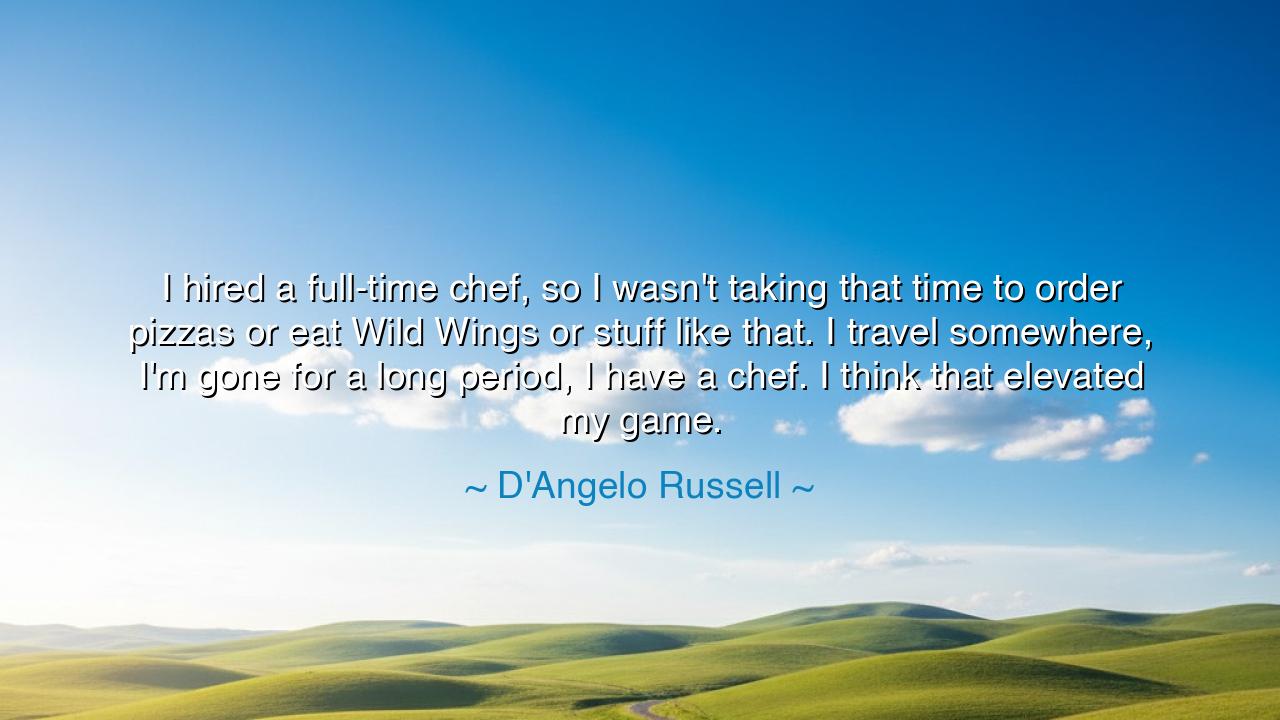
I hired a full-time chef, so I wasn't taking that time to order
I hired a full-time chef, so I wasn't taking that time to order pizzas or eat Wild Wings or stuff like that. I travel somewhere, I'm gone for a long period, I have a chef. I think that elevated my game.






D’Angelo Russell, speaking not only as an athlete but as a man disciplined in his craft, once declared: “I hired a full-time chef, so I wasn’t taking that time to order pizzas or eat Wild Wings or stuff like that. I travel somewhere, I’m gone for a long period, I have a chef. I think that elevated my game.” These words, born of the modern courts of sport, are nevertheless timeless. They speak of discipline, of preparation, and of the truth that greatness is not built only on talent, but on the small choices of daily living.
The first wisdom lies in the presence of the chef. A chef is not merely one who cooks, but one who safeguards the body, fuels the spirit, and frees the mind for higher pursuits. By entrusting his nourishment to another, Russell confesses that excellence requires structure. Just as kings had scribes and warriors had squires, the modern athlete has guides who prepare the body for battle. In this, Russell recognizes that mastery of the game demands mastery of the smallest details—even what one eats.
The second truth is the sacrifice of indulgence. He mentions refusing the lure of pizzas and wings, choosing instead the discipline of nutrition. This echoes the old wisdom: that victory is born not in the moment of combat, but in the quiet hours of training, of restraint, of denying what is easy in favor of what is necessary. The gladiators of Rome ate sparingly and trained relentlessly; the samurai treated food as fuel, not distraction. Russell’s words belong to this same lineage: to rise, one must choose the hard road over the soft.
His reference to travel deepens the lesson. In the life of an athlete, journeys are constant—city to city, arena to arena. Travel tempts the weary to slacken, to indulge, to lose rhythm. But Russell turns travel into an opportunity for discipline, bringing his chef with him as a safeguard. This is wisdom: to prepare against weakness, to bring with you the tools that guard your purpose, so that no matter where you wander, you remain steadfast.
History offers mirrors to this truth. Consider Alexander the Great, who marched with his armies across the known world. Though he conquered nations, he carried with him tutors, scholars, and companions who sharpened his mind and preserved his discipline in foreign lands. Or think of the monastic orders, who traveled far but brought with them their rules of fasting and prayer, ensuring their spirit was never lost to indulgence. Russell, in his own way, echoes this ancient practice: carrying with him the discipline that sustains his path, wherever he may go.
The heart of his statement lies in the phrase: “I think that elevated my game.” It is not only about food, but about the transformation of the self. By making this choice, Russell reveals that greatness is not an accident, but a structure, built step by step, meal by meal, choice by choice. What seems small—the presence of a chef, the refusal of a pizza—becomes the foundation of victory. Greatness rests not only in what the world sees, but in the hidden sacrifices made when no one is watching.
Thus, the lesson is clear: discipline in the small things creates greatness in the large. Do not despise the hidden choices of daily life, for they shape the body, the mind, and the soul. If you wish to rise, guard your routines, prepare your provisions, and remove the obstacles that tempt you from your path. Let every detail of your life point toward your purpose, so that when the hour of testing comes, you are already victorious.
Practical counsel follows: ask yourself what small indulgences weaken your resolve. Replace them with habits that strengthen you. Create systems, as Russell did, that protect you from your own weakness. Seek guides, teachers, or allies who can help you build discipline into your days. For in the end, the secret of greatness is not mystery—it is the daily work of building yourself into one who is ready. And when you do, like Russell, you will say with confidence: these choices have elevated my game.






AAdministratorAdministrator
Welcome, honored guests. Please leave a comment, we will respond soon